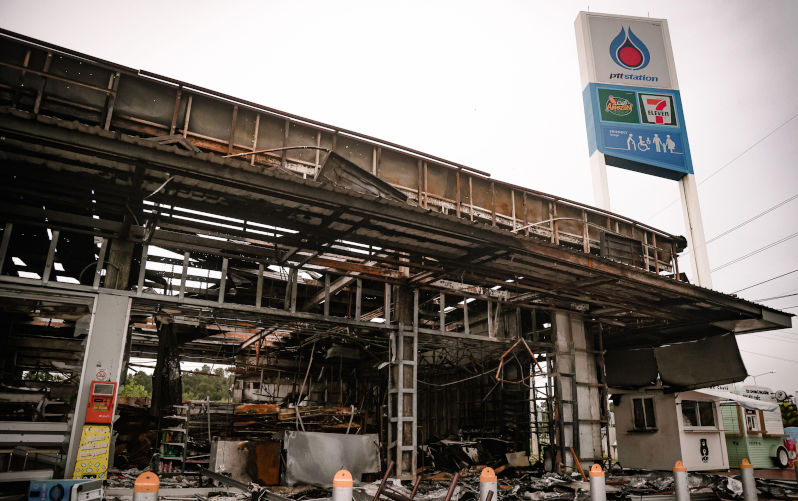Inspired by Gaza, Trump offers some hope on Thai-Cambodian border
October 17, 2025
US president tells Malaysia he intends to end the conflict at the ASEAN Summit.
Fresh from ending Israel’s war in Gaza, US President Donald Trump insists he will also end the border conflict between Thailand and Cambodia when leaders of the Association of South East Asian Nations meet in Malaysia later this month.
Despite Trump’s rabid addiction to having his name up in lights, his latest peace effort deserves to be taken seriously, even if his chances of success remain unlikely.
That message was delivered by Malaysian Foreign Minister Mohamad Hasan, who said on 14 October that Trump is “looking forward” to witnessing a ceasefire between Thailand and Cambodia, which will require both sides to remove all land mines and heavy artillery from their borders.
“During the summit, we hope to see the signing of a declaration known as the Kuala Lumpur Accord between these two neighbours to ensure peace and a lasting ceasefire,” Mohamad said.
Much is at stake. ASEAN’s standing has been broadly discredited through a range of recent failures, led by its inability to deal effectively with a bloody civil war in Myanmar, where in excess of 80,000 people have died since early 2021, about a third more than in Palestine during the same period.
The scourge of criminal syndicates running scam compounds through human trafficking networks is a close second amid allegations of collusion among Cambodia’s ruling elites, encircling Prime Minister Hun Manet and his father Hun Sen.
Trump’s determination has ensured that the Thai-Cambodian border conflict will top the agenda of the 26 to 28 October ASEAN meeting, and he will enter the diplomatic arena armed with the Dismantle Foreign Scam Syndicates Act, which is en route to the US Congress.
Crime syndicates and their association with Cambodia have been cited as one of many reasons behind the angst between Phnom Penh and Bangkok, particularly after Thailand initiated a Chinese-backed crackdown on organised crime earlier this year, but with little impact.
Accompanying the act is a who’s who list of Hun Sen confidants, political allies, relatives and friendly businesses, all to be sanctioned assuming the act is passed, and it could be used to entice Thai Prime Minister Anutin Charnvirakul into the negotiations.
But few believe Anutin has any intention of ending the conflict and reopening the border before the next Thai election, which is not expected to until May.
As Mohamad was announcing Trump’s plan for a ceasefire, the Thai military was continuing its dreaded psyops campaign designed to frighten Khmer families off their land while deploying bulldozers and demining equipment over disputed territory around Prey Chan.
Of paramount concern for Phnom Penh is the fate of 18 Cambodian POWs, soldiers who were snatched while shaking hands with Thai troops the minute after hearing the 28 July ceasefire was struck, ending a brutal five-day battle fought along the 817-kilometre frontier.
Jurng Montarni, head of the Regional Delegation of the International Committee of the Red Cross in Bangkok, last met with the Cambodian POWs on 13 October, delivered family letters, and confirmed they are in good health with regular access to food.
He pledged to continue efforts to secure their release and repatriation to Cambodia in accordance with the Geneva Conventions, but their confinement and the way they were taken after a truce was sealed seemed unnecessary and have deeply upset all Cambodians.
That 28 July truce was brokered by Malaysia as the US and China applied diplomatic pressure, but it has been constantly undermined by allegations of ceasefire breaches from both sides.
And the major sticking point remains: the Thai military’s refusal to accept the border as negotiated by French colonialists more than a century ago, as it would give the Cambodians control of too much of the military high ground.
It’s an obstacle that only Anutin can overcome if the land border is to be reopened, and for that, he will have to moderate his tone when addressing Thai ultranationalists, who are taking great pleasure in bullying ordinary Khmers.
They include the social influencer Guntouch Pongpaiboonwet — known as Gun Jompalang — who wanted to use a convoy of 14 sewage trucks to spray waste on Cambodian villagers.
He is also blamed by the current psyops campaign in Chouk Chey and Prey Chan, blasting pre-recorded high-decibel sounds of ghosts, children screaming, dogs howling, rattling chains and helicopters across the border.
But perhaps more importantly, the border closure is costing more than US$4 billion in annual trade between Thailand and Cambodia, while restricting trade routes and disrupting supply chains through Laos and Vietnam.
About 800,000 working Cambodians returned from Thailand after deserting building sites and other now struggling businesses, but there was little joy at home, where just 21% have jobs and more than half a million remain unemployed.
GDP growth in both countries is low, and the hardest hit, as always, are the poor.
That should be reason enough to end the conflict and reopen the border, but politicians and power are a crude combination. Unless Trump can force both sides to buckle, the undeclared war on the Cambodian-Thai border will continue, signalling another ASEAN disgrace.
Republished from UCA News, 14 October 2025
The views expressed in this article may or may not reflect those of Pearls and Irritations.

